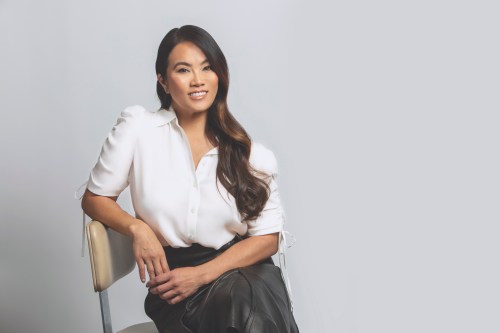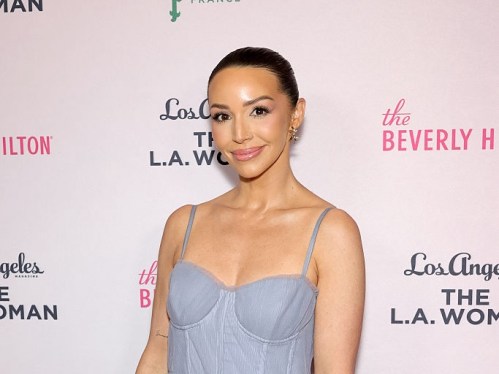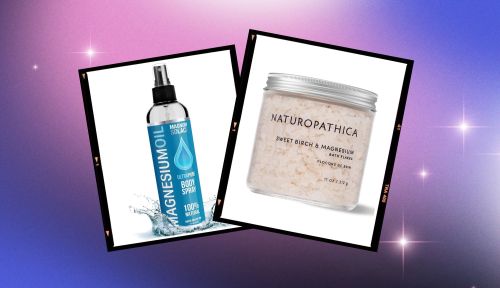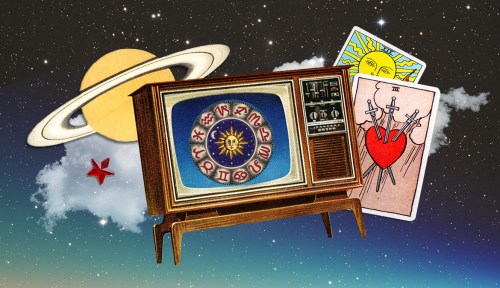When Sabrina Carpenter sang “can't help myself, hormonеs are high” in her song “Juno"—a fantasy about getting pregnant with a romantic partner, and posed in a different “position” each night of her concert tour, she definitely caught everyone’s attention.
Experts in This Article
sex and relationships expert, author, and public speaker
sexologist and medical advisor at Ro
OB/GYN and Winx Health Medical Advisor
But could she have been speaking scientifically about the spike in hormones making her feel some type of way? It’s entirely possible. So we asked our experts what the real connection is between ovulating and sex drive—here's what they had to say.
“Ovulation and libido are closely linked due to the natural ebb and flow of hormones throughout the menstrual cycle,” explains Carolyn Ross, MD, an OB/GYN and Winx Health Medical Advisor. “Understanding these shifts can help explain why some people feel an increase in sex drive at certain times of the month—and why others might not.”
Here’s everything you should know about your hormones and sex drive during ovulation, and how you should proceed, whether you’re trying to get pregnant or not.
So, what happens during ovulation?
If you're scrolling through TikTok or IG Reels, you're probably familiar with some of the different phases of the menstrual cycle from seeing all sorts of cycle-syncing workouts or eating plans. But, here's a more in-depth breakdown.
Your cycle starts with the menstrual phase. For the next 14 days after you get your period, the follicular phase occurs, in which egg cells mature in the ovaries and prepare to release. “During this time, the hormone estrogen starts rising, making many people feel more social, energized, and confident,” explains Dr. Ross.
The next phase is ovulation, when estrogen and testosterone (which also plays a role in sexual function in women) peak.1 The hormone spike triggers the release of an egg halfway through your menstrual cycle, on or around day 14. “This hormonal surge is what often leads to a noticeable spike in libido, heightened sensitivity, and an increased desire for physical intimacy,” says Dr. Ross.
Yes, you may notice that you’re feeling flirtier, but there are often other physical signs of ovulation. Some of these signs include a slight increase in body temperature and clear, stretchy discharge, which are biologically designed to help with the right atmosphere for conception and sperm motility, respectively, Dr. Ross explains. Because your physical senses are heightened during the ovulation period, you may even notice a sharper sense of smell or taste, she adds.
It’s also possible to have some discomfort during this time as well. You shouldn’t experience full-blown period cramps, but you may notice some mild cramping or pain on one side of your stomach where the ovary is releasing the egg, according to Dr. Ross. The hormonal changes can provoke some totally normal light spotting, but won’t result in bleeding like your actual period.
Why (and how) does ovulation make you horny?
Hormonal fluctuations during ovulation are partially responsible for making you horny—particularly the peak in estrogen leading up to ovulation, Dr. Ross explains. Not only does it give you a mood and energy boost, but estrogen is also a vasodilator.2 In simple terms, estrogen increases blood flow as well as lubrication to the vagina and entire pelvic area.
But there's another key hormone to keep in mind: testosterone. While testosterone is typically thought of as a “male” hormone, it’s present in people assigned female at birth to a smaller degree—and has an influence on libido by helping to stimulate both desire and arousal.3
This hormonal peak is likely to last for anywhere between one to six days, but it varies from person to person. Ovulation only happens in a 12 to 48 hour span, but you’re technically fertile for a window of five to six days before ovulation actually starts. (Remember that sperm can survive in the vagina, waiting for an egg to be released, for that entire time window, Dr. Ross says). Some people might feel peak arousal for those entire five to six days, while others may only experience the spike in the day or two before ovulation hits, especially when estrogen and testosterone hit their highest levels, she adds.
In addition to hormones, evolution is also at play. “The usual explanatory theory is that increased desire during ovulation is an evolutionary encouragement for more efficient reproduction,” explains Pepper Schwartz, PhD, a sexologist, relationship expert, and Ro advisor.
“In other evolutionary theories, the idea is that any behavior that increases human survival is likely to be passed on to future populations. So, women who would have sex when ovulating would be more likely to have more children than women who did not.” Your body essentially adapts to the ideal conditions to get pregnant, but that doesn’t mean you have to feel pressured to do so. (For what it's worth, that might be more of a social message at play).
However, not everyone experiences this spike in desire with ovulation. Everyone’s bodies and menstrual cycles are different. For example, people who take hormonal birth control methods like the pill, patch, ring, shot, or implant often do not ovulate (as a method to prevent pregnancy) and will likely not experience that estrogen peak or as many hormonal fluctuations in general.4
"Since these methods stop ovulation, your estrogen and progesterone levels stay more stable, leading to a more consistent, but potentially less variable, libido," says Dr. Ross. "It’s important to understand that these changes are normal, and everyone's experience can be a bit different depending on their body and the specific birth control they use."
What else might affect your sex drive?
Your heightened hormones aren't the only things that affect your sex drive. Sensory perception and lubrication are also key biological factors that can increase your libido—since it’s likely to be more comfortable and pleasurable during this time, says Tara Suwinyattichaiporn (aka Dr. Tara), PhD, a Kinsey-certified sexologist and tenured professor of human communication covering modern intimacy and sexual education.
It's also important to note that aging and menopause can also cause your libido to oscillate. But, there are certain health conditions that have a higher risk of contributing to hormonal imbalances that can lead to fluctuations in your sex drive, too. These include:5
“Be aware, though, that these changes can be caused by mental as well as physical causes–or be a combination of the two,” says Schwartz. Don’t count out mental health conditions or certain anxiety and depression medications as factors in lower sex drive either.6
The bottom line
It’s certainly plausible that you might feel a little extra horny and more into your partner(s) during ovulation. That happens because of hormonal fluctuations (especially if you’re actually ovulating and not taking hormonal birth control). That said, if you’re trying to get pregnant, your best bet is having sex in the few days leading up to ovulation, Dr. Ross says.
And if pregnancy isn't the goal, you may not want to depend solely on the pull-out method because of its minimal effectiveness at preventing pregnancy. Dr. Tara advises using a form of hormonal contraception (the pill, ring, and hormonal IUD are all options) and/or non-hormonal birth control such as condoms.
If you’re noticing major changes in your libido, in either direction, and this seems to be linked to distress, pain, or mood changes, it's a good idea to get support. You can start by bringing it to your OB/GYN or primary care provider's attention, Dr. Ross advises.
But it's also important to know that a low or high libido aren't things to worry about. “There’s no real issue with low libido if you don't care or if maybe you’re asexual. At the same time, it’s also not a problem to have super high libido if it doesn’t negatively impact your life,” says Dr. Tara. “My rule of thumb is to seek out professional help when, in your own opinion, it’s a persistent problem in your daily life, your relationship, or your family planning.”
- Weiss, Rita V et al. “Testosterone therapy for women with low sexual desire: a position statement from the Brazilian Society of Endocrinology and Metabolism.” Archives of endocrinology and metabolism vol. 63,3 190-198. 18 Jul. 2019, doi:10.20945/2359-3997000000152 ↩︎
- Wang, Xiao-Qing et al. “Therapeutic Effects of 17β-Estradiol on Pelvic Organ Prolapse by Inhibiting Mfn2 Expression: An In Vitro Study.” Frontiers in endocrinology vol. 11 586242. 25 Nov. 2020, doi:10.3389/fendo.2020.586242 ↩︎
- Davis, S R, and J Tran. “Testosterone influences libido and well being in women.” Trends in endocrinology and metabolism: TEM vol. 12,1 (2001): 33-7. doi:10.1016/s1043-2760(00)00333-7 ↩︎
- Caruso, Salvatore et al. “How Does Contraceptive Use Affect Women's Sexuality? A Novel Look at Sexual Acceptability.” Journal of clinical medicine vol. 11,3 810. 3 Feb. 2022, doi:10.3390/jcm11030810 ↩︎
- Montgomery, Keith A. “Sexual desire disorders.” Psychiatry (Edgmont (Pa.: Township)) vol. 5,6 (2008): 50-5. ↩︎
- Lorenz, Tierney et al. “Antidepressant-Induced Female Sexual Dysfunction.” Mayo Clinic proceedings vol. 91,9 (2016): 1280-6. doi:10.1016/j.mayocp.2016.04.033 ↩︎
Sign Up for Our Daily Newsletter
Get all the latest in wellness, trends, food, fitness, beauty, and more delivered right to your inbox.
Got it, you've been added to our email list.









